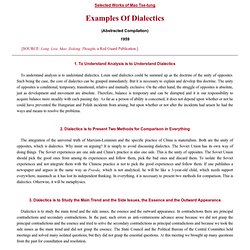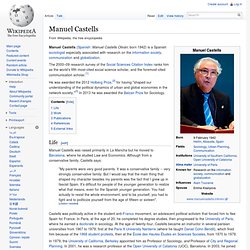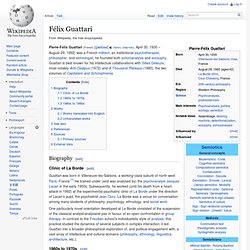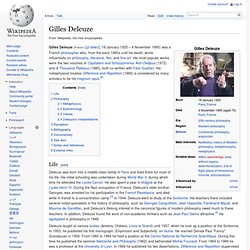

Examples Of Dialectics. Selected Works of Mao Tse-tung (Abstracted Compilation) [SOURCE: Long Live Mao Zedong Thought, a Red Guard Publication.] 1.

To Understand Analysis is to Understand Dialectics To understand analysis is to understand dialectics. 2. The integration of the universal truth of Marxism-Leninism and the specific practice of China is materialism. 3. Dialectics is to study the main trend and the side issues, the essence and the outward appearance. 4. Marxism tells us that to examine a question, it is necessary to consider the essence, the main trend and the line. 5. All provinces, municipalities and autonomous regions should call meetings once every two months to review and sum up their work. Things invariably have a beginning and an end. To talk about all this is to make us think and enliven our thought. Manuel Castells. Manuel Castells (Spanish: Manuel Castells Oliván; born 1942) is a Spanish sociologist especially associated with research on the information society, communication and globalization.

The 2000–09 research survey of the Social Sciences Citation Index ranks him as the world’s fifth most-cited social science scholar, and the foremost-cited communication scholar.[1] He was awarded the 2012 Holberg Prize,[2] for having "shaped our understanding of the political dynamics of urban and global economies in the network society. Complex Urbanism. The following are a series of notes.

They are neither sequential in presentation nor didactic in tone. (Numbering allows for identification not prescription.) They can be ordered and reordered. They provide a setting in which mapping and development – traditionally understood as the present and the future – can be rethought thus allowing the urban another expression.
Scale shifts. Credits Andrew Benjamin is Professor of Critical Theory and Philosophical Aesthetics in the Centre for Comparative Literature and Cultural Studies in Monash University. Spatial deconcentration in D.C. - Midnight Notes. 1981 article about a US Government housing policy - conceived in the aftermath of the 1960s ghetto riots - arguing that the policy was aimed at removing concentrations of potentially rebellious blacks and other poor people from the inner city and disperse them in small groups to the suburbs.

Serious issues have been raised about some of the facts of this article, which are discussed here, but we reproduce it for reference. Published in 'Midnight Notes', Vol. II, #2, July 1981, MA, USA Original article first published by the Yulanda Ward Memorial Fund, Washington, 1981(?). Spatial Deconcentration in D.C. [Introduction By Midnight Notes] We begin with a murder - that of Yulanda Ward in Washington, D.C. at 2 A.M., November 2, 1980.
Why be concerned with this one murder? We reprint the following article on spatial deconcentration for two reasons. This article focusses on Washington, D.C. but the spatial deconcentration program is nationwide. Anarchist Views of the City. Félix Guattari. Pierre-Félix Guattari (French: [ɡwataʁi] Biography[edit] Clinic of La Borde[edit] Guattari was born in Villeneuve-les-Sablons, a working-class suburb of north-west Paris, France.[1] He trained under (and was analysed by) the psychoanalyst Jacques Lacan in the early 1950s.

Subsequently, he worked (until his death from a heart attack in 1992) at the experimental psychiatric clinic of La Borde under the direction of Lacan's pupil, the psychiatrist Jean Oury. La Borde was a venue for conversation among many students of philosophy, psychology, ethnology, and social work. One particularly novel orientation developed at La Borde consisted of the suspension of the classical analyst/analysand pair in favour of an open confrontation in group therapy. 1960s to 1970s[edit] From 1955 to 1965, Guattari edited and contributed to La Voie Communiste (Communist Way), a Trotskyist newspaper.[2] He supported anti-colonialist struggles as well as the Italian Autonomists. 1980s to 1990s[edit] Works[edit]
Gilles Deleuze. Gilles Deleuze (French: [ʒil dəløz]; 18 January 1925 – 4 November 1995) was a French philosopher who, from the early 1960s until his death, wrote influentially on philosophy, literature, film, and fine art.

His most popular works were the two volumes of Capitalism and Schizophrenia: Anti-Oedipus (1972) and A Thousand Plateaus (1980), both co-written with Félix Guattari. His metaphysical treatise Difference and Repetition (1968) is considered by many scholars to be his magnum opus.[2] Life[edit] Deleuze was born into a middle-class family in Paris and lived there for most of his life. His initial schooling was undertaken during World War II, during which time he attended the Lycée Carnot. Deleuze taught at various lycées (Amiens, Orléans, Louis le Grand) until 1957, when he took up a position at the Sorbonne. In 1969 he was appointed to the University of Paris VIII at Vincennes/St. Deleuze himself found little to no interest in the composition of an autobiography. Noam Chomsky - Noam vs. Michel Foucault (Eng. subs)